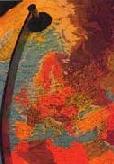

![[AUSSENPOLITIKFORSCHUNG]](/images/digbib/d_digbib.gif)

Political crisis in Russia : the regional dimension / Irina Busygina. - Bonn, 1993 (Studie der Abteilung Außenpolitikforschung im Forschungsinstitut der Friedrich-Ebert-Stiftung ; 58). - ISBN 3-86077-112-4
TEILDOKUMENT:
1.Introduction: The Place of the Geographical Factor in Russia’s Realities
In the events of fall 1993, Russian President Yeltsin apparently defeated his most important opponents in the Russian parliament. Analyzing Russia’s political crisis, many in the West concentrated on the struggle between the President and those anti-reformist groups consolidated around Vice-President A. Rutskoi and Speaker of the Parliament R. Khasbulatov. Consequently, another aspect was often overlooked: the regional dimension of the crises. Today, using the adjective „regional" almost automatically attracts public attention - be it in a statesman’s speech or a newspaper article. Although the landmarks of regionalization in Russia have long been visible to everyone, they have always taken the country by surprise since they represent an unsusual aspect of Russia’s political culture.
Prominent Russian philosophers repeatedly stressed that the „geographical factor" is one of the basics (and at the same time peculiarities) of Russia’s identity. In the words of the philosopher P. Chaadaev, „this is one factor that has strongly dominated our history, that has concentrated the philosophy of this history, that appears in all the epochs of our social life and determines their nature, that is a significant element of our political grandeur and at the same time a real reason for our mental weakness." [ P. Chaadaev, Apologetics of a Madman, Moscow, 1989, p. 148.]
The peculiarity of Russia’s national self-awareness has always included the phenomenon of a „moving border", a border that is not strictly drawn on the territory. Primarily it probably referred to the times of the Tatar-Mongolian yoke. Absolute hostility to this power could have led to the formation of a relatively medium-sized, Europe-oriented state. The Russians have chosen another direction - to incorporate this opposing power. Thus, the external contradiction has become an internal one. Later, with continued Russian expansion to the East, the phenomenon of a „moving border" grew even stronger.
The incorporation of external contradictions potentially leads to internal instability. This is why the inability of the Soviet leadership to realize the possible consequences of the tremendous scale of the country and its multinational character looks paradoxical.
Taking possession of giant spaces was accompanied by a massive centralization of the country. Russia’s unique centralized system was built on the disproportionate weakness of local communities and local authorities. Nowadays Moscow (and to a lesser extent Saint Petersburg) „absorbs" most of the intellectual, cultural and spiritual potential of the country. However, from the moment Russia acquired an independent statehood, the process of decentralization began actively to develop. Currently, Russia is perceived by the international community as the „country of countries" - as a unique community of diverse social and economic structures and cultural landscapes. For the West, the „opening" of Russia was like discovering a new world.
Although the perception of it in the West has changed, Russia remains essentially alien. It still „attracts Europeans with its mystery, but repels with its barbarity." [ N. Berdyaev, Destination of Russia, Moscow, 1918, p. 136.] According to many European political researchers, Russia represents another civilization and a political culture fundamentally different from the West. [ See, for example, G. Schopflin, N. Wood (eds.), In Search of Central Europe, Cambridge, Oxford, 1989. The main idea of the book is to demonstrate the differences and contradictions between Europe and Russia and to stress the impossibility of their rapprochement.] Recently, regionalization in Russia has attracted the attention of researchers in Europe, particularly in Germany. [ See, for example, S. De Spiegeleire, "Raspad: The Further Disintegration of the Russian Federation and its Policy Implications for the West," Stiftung Wissenschaft und Politik, Ebenhausen, February 1993.] However, European knowledge of regional developments in Russia remains limited. The same could be said for Russian knowledge about Europe.
For decades, in Western Europe the processes and phenomena of regional developments and the problems of federalism have been at the focus of scientific research and political debates. For Russia, they are still more or less „terra incognita".
In this paper I will examine the development of the political relations between Russia’s Center and the regions from 1990 to the present. Although these relations were in part overshadowed by the struggle between President Yeltsin and the parliament, these two layers of Russia’s political life were also strongly interrelated.
However, I will concentrate on the Center-region relationship. This follows from the basic assumption that Russia can only develop into a robust democracy if it manages to build a genuine federation which solves the main conflicts between Center and periphery. In my analysis I will also put forward some proposals of how to reach this end.
© Friedrich Ebert Stiftung | technical support | net edition fes-bibliothek | 9.1. 1998